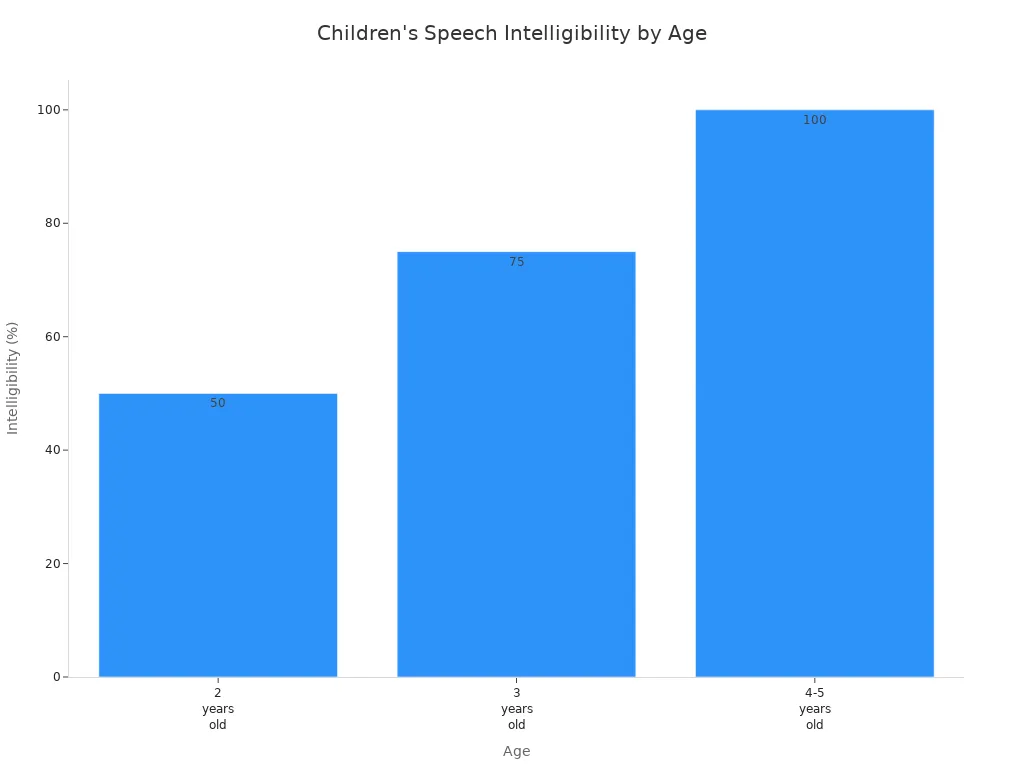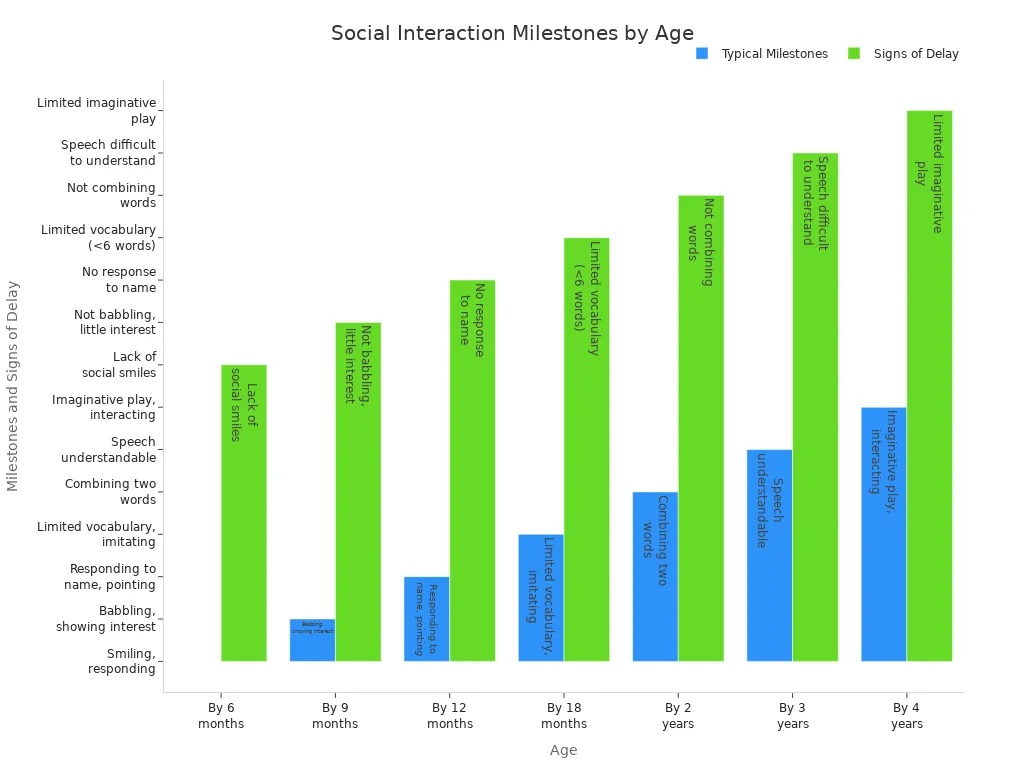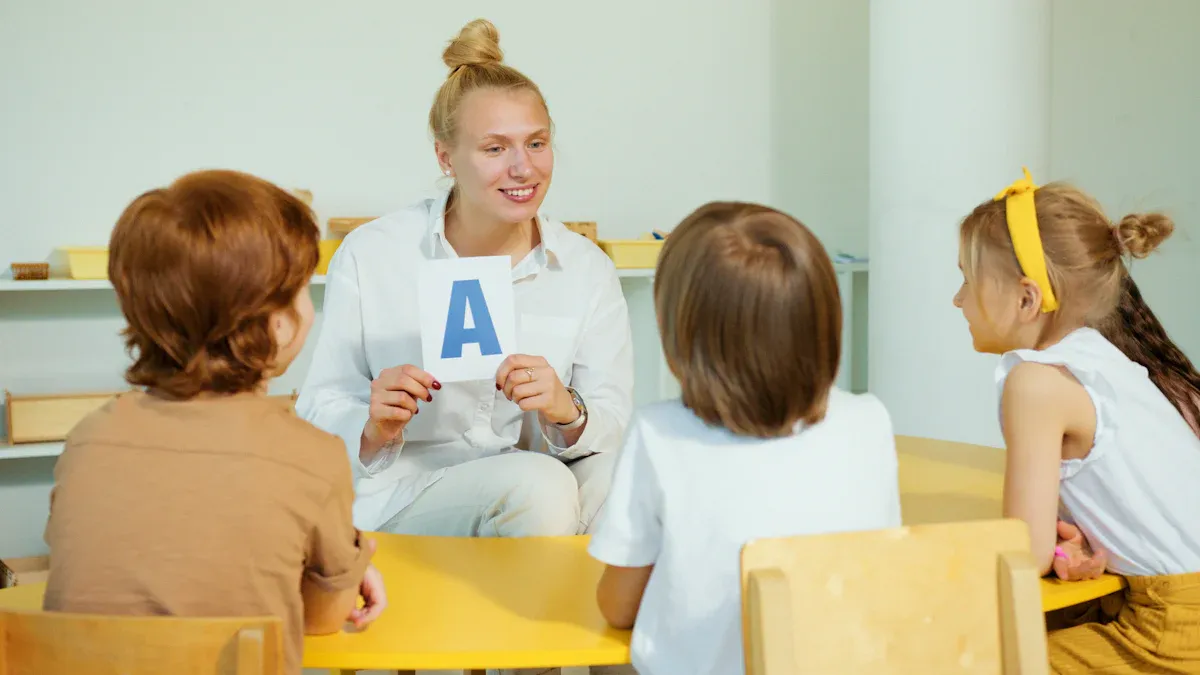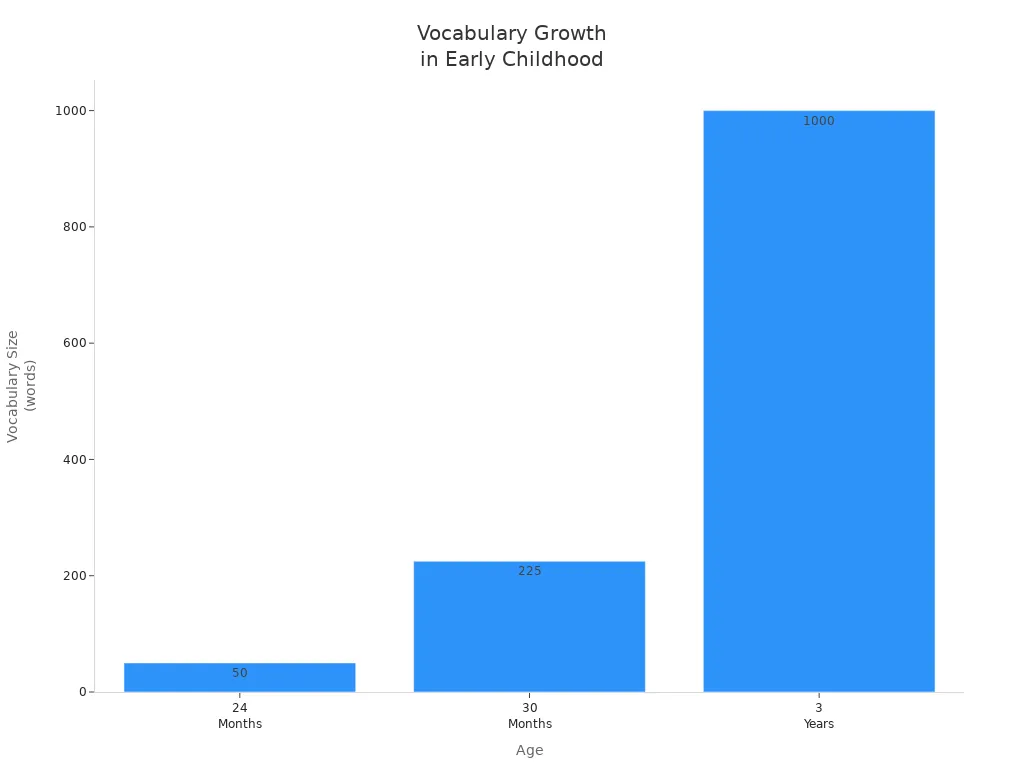Speech Therapy for Kids 8 Signs You Should Not Ignore

You may feel worried about your child's speech. Some signs need you to pay attention:
Small vocabulary for their age
Trouble following directions
Errors in speech sounds
Stuttering or repeating sounds
Hard-to-understand speech
Difficulty imitating words
Delayed social skills
Frustration when talking
Many kids show these signs. Studies say 8% have language problems. One in twelve kids have speech or language disorders.
Acting early can help your child talk better.
Speech therapy for kids can help with these problems.
Key Takeaways
Look for signs of speech delays, like knowing few words or having trouble with directions. Acting early can help your child do better.
If your child has trouble speaking clearly or makes many mistakes, think about getting help from a speech-language pathologist.
If your child gets upset when talking, there may be bigger problems. Help your child by talking with them and getting expert help.
Play reading and word games with your child at home. This can help their language skills and make therapy work better.
Listen to your feelings. If you see worrying signs, talk to your child's doctor for advice and possible referrals.
8 Key Signs
Limited Vocabulary for Their Age
Your child may use fewer words than other kids. Kids with limited vocabulary often find it hard to name things. They may not talk about feelings or events well. This can make talking with them short or confusing. A 4-year-old should know many words and use longer sentences. If your child only says a few words or repeats phrases, this could be a problem.
Age Group | Sentence Length | Speech Clarity | |
|---|---|---|---|
3 years | 150-200 words | 2-3 words | 75% clear |
4 years | 300-500 words | 4-5 words | Mostly clear |
5 years | 2,500+ words | 5-6 words | Clear speech |
Kids with limited vocabulary may also have grammar problems. They might struggle to tell stories. Almost half of kids with developmental language disorder have trouble with vocabulary. This can hurt learning and social skills.
Tip: If your child uses fewer words than expected, talk to a professional.
Difficulty Following Directions
You may notice your child has trouble with simple tasks. They might not listen or forget steps. Sometimes you need to repeat instructions. Some kids do not understand group talks or have problems in school.
Kids who have trouble following directions may show signs of ADHD. They may also have auditory processing disorder. These problems can affect learning and how they get along with others. If your child seems lost or confused with instructions, it could be a speech or language issue.
Many kids have trouble with directions as they grow.
Some kids need extra help to remember instructions.
Trouble with directions can mean problems with social and school tasks.
Speech Sound Errors
Speech sound errors happen when kids say words wrong. You may hear sounds switched, left out, or changed. For example, a child might say "tat" for "cat" or "wed" for "red." Young kids often make these mistakes, but most go away as they get older.
Description | Typical Age of Resolution | |
|---|---|---|
Articulation Disorders | Hard to make sounds because of muscle control. | Usually gone by age 6. |
Phonological Disorders | Trouble with sound patterns; mistakes last past age 3 or 4. | May go away by age 6, but sometimes last longer. |
Stuttering | Stuttering starts between ages 2 and 5. | It may go away with age. |
About 10% of preschool and school kids have speech sound errors. If your child’s speech is hard to understand or mistakes last past age 6, get help.
Stuttering or Repetition of Sounds
Stuttering means your child repeats parts of words or gets stuck. You may hear "b-b-ball" or lots of pauses. Stuttering often starts between ages 2 and 6. Most kids stop stuttering, but if it lasts more than six months, it needs attention.
Statistic | Value |
|---|---|
Preschool kids who stutter | |
Kids who recover on their own | 88%–91% |
Average age stuttering starts | 33 months |
Family history, stress, and environment can make stuttering last longer. If your child has trouble getting words out or feels upset, speech therapy can help.
Hard to Understand Speech
You may find it hard to understand your child. Others may also have trouble. Experts use tests and play to check speech clarity. By age 4, most kids should be easy to understand.
Age | Intelligibility Percentage |
|---|---|
2 years old | 50% |
3 years old | 75% |
4-5 years old | 100% |

If your child’s speech is hard to understand after age 4, it could mean speech sound errors or another language problem.
Trouble Imitating Sounds or Words
Kids learn to talk by copying sounds and words. Trouble imitating sounds or words means not repeating simple words, rhymes, or songs. By age 2, most kids say at least 50 words and use short sentences. If your child does not copy sounds or words, it may be a speech or language disorder.
Age Range | Milestones Associated with Imitation of Sounds/Words |
|---|---|
6-9 months | - Repeating syllables |
- Copying speech sounds | |
- Trying different pitch and volume | |
- Babbling more consonants and vowels | |
- Making long sounds | |
2-3 years | - Saying 50 words or more |
- Using two- or three-word sentences | |
- Repeating rhymes, songs, and stories | |
- Answering 'what' questions |
Trouble copying sounds or words can mean a developmental delay. You may see your child not respond to simple instructions or have trouble with language games.
Delayed Social Interaction
Delayed social interaction means your child does not connect with others as expected. You may see less eye contact or fewer smiles. Your child may not want to play with other kids. Kids with speech or language problems often miss social milestones.
Age | Signs of Delay | |
|---|---|---|
By 6 months | Smiling, responding to caregivers | No social smiles or little response |
By 9 months | Babbling, showing interest in social interactions | Not babbling or little interest in social interactions |
By 12 months | Responding to their name, pointing, waving | No response to name, no pointing or waving |
By 18 months | Using a limited vocabulary, copying sounds or gestures | Limited vocabulary (less than six words) |
By 2 years | Using two words together | Not using two words, trouble with instructions |
By 3 years | Speech clear to caregivers | Speech hard for caregivers to understand |
By 4 years | Playing pretend, interacting with peers | Trouble with pretend play |

Speech therapy helps kids get better at social skills. It helps with eye contact and understanding social cues. If your child avoids group play or has trouble joining talks, early help can make a big difference.
Frustration When Communicating
Kids who have trouble talking often feel frustrated. You may see tantrums, withdrawal, or acting out when your child cannot say what they want. Frustration when talking can cause social and emotional problems.
Kids may avoid group activities or language games.
They may have trouble following talks or answering quickly.
Tantrums can happen when words are hard to say.
Some kids show less interest in talking or playing.
Long-term frustration can lead to anxiety and behavior problems. It can also cause trouble with friends. Early speech therapy helps kids feel confident and enjoy talking with others.
Why Early Action Matters
Impact on Learning
You are important in your child’s learning. If you see a speech delay, act fast. Getting help early can really help your child. Early support lets your child catch up with classmates. It also stops future school problems. Kids who get speech therapy before school learn more words. They also get better at reading and listening. Your child may follow classroom rules more easily. They may join group work with more confidence.
Getting help early can lower the chance of learning problems.
Kids who get support early often beat language problems.
Early help makes it easier to hear and use sounds, which helps reading.
Impact Area | Description |
|---|---|
Academic Performance | Early speech therapy helps kids talk better and avoid school problems. |
Listening Comprehension | Weak speech skills make it hard to follow spoken directions and learn. |
Phonemic Awareness | Trouble with sounds can hurt reading and understanding, making school harder. |
Kids with speech delays may have trouble reading and with numbers. You can help your child by getting support as soon as you see signs.
Tip: Acting early gives your child the best chance to do well in school and later in life.
Social and Emotional Effects
Speech and language problems can hurt your child’s friendships and confidence. Your child may feel left out or upset when playing. Early help lets kids build better social skills and make friends. When you get help quickly, your child learns to share feelings and understand others.
Kids with developmental language disorder may find it hard to make friends and control actions. These problems can cause them to feel alone or have low confidence. Kids with trouble using language may get picked on or left out, which can make them feel lonely and bad about themselves.
Speech therapy helps kids grow emotionally by making talking easier. Your child may feel less worried and want to join group games. Early help also teaches kids to handle shyness and make good friends.
Kids who get help early feel better about themselves and have more fun with friends.
Speech and Language Milestones

What to Expect by Age
You can track your child’s progress by looking at speech and language milestones. Children reach important steps at different ages. At 24 months, most children say at least 50 words and start to put two words together. By 30 months, you may hear 150 to 300 words and more complex phrases. At 3 years, children often use over 1,000 words and speak in sentences with three or four words.
Age | Expected Vocabulary Size | Key Milestones |
|---|---|---|
24 Months | 50+ words | Starting to combine two words into simple phrases. |
30 Months | 150-300 words | More complex phrases and questions. |
3 Years | 1,000+ words | Using 3-4 word sentences and clearer speech. |

At 4 years, you should expect your child to use complete sentences with about five words. Children at this age usually understand up to 5,600 words and use 900 to 1,000 words when speaking. You may notice your child asking questions like “how,” “why,” and “when.” Pronouns become easier for them to use. These milestones show healthy language development.
Tip: Every child grows at their own pace. If you notice your child falling behind, keep watching for changes.
When to Seek Help
You play a key role in supporting your child’s speech and language growth. Experts recommend these steps if you have concerns:
Monitor Developmental Milestones
Track your child’s speech and language skills. If your child does not meet age-appropriate milestones, you may need to act.Look for Red Flags
Watch for signs like severe speech delays, limited social interaction, or trouble following directions. These signs may mean your child needs help right away.Take an Individualized Approach
Make sure any therapy fits your child’s unique needs. A speech-language pathologist can give a full evaluation and create a plan.
You should seek help if your child struggles to combine words, has trouble being understood, or avoids talking. Early support can improve language development and boost confidence.
Note: Trust your instincts. If you feel worried, reach out to a professional for advice.
What to Do Next

Talk to Your Child’s Doctor
Start by telling your child’s doctor about your worries. Pediatricians can spot speech delays and language delay. They look for signs like not answering to their name. They also check for late babbling or jargon. Trouble with feeding and swallowing is another sign. Doctors may ask if your child gets upset when talking. They might ask about problems with sentence structure. If you see any of these, tell the doctor. Your doctor might send you to a speech-language pathologist. They could also suggest pediatric speech therapy.
Step | What You Can Do |
|---|---|
1 | Write down signs you see, like not answering to their name or late babbling or jargon. |
2 | Ask about pediatric speech therapy and early help programs. |
3 | Talk about trouble with feeding and swallowing or getting upset when talking. |
Consult a Speech-Language Pathologist
A speech-language pathologist checks for speech delays and speech challenges. You can set up a visit if your child has trouble with sentence structure. Go if you notice late babbling or jargon. Trouble with feeding and swallowing is another reason. The pathologist will make a plan for pediatric speech therapy. The plan fits your child’s needs. Getting help early helps kids with language delay and speech challenges.
Tell your child’s doctor what you notice.
Ask for a referral for pediatric speech therapy.
Meet a speech-language pathologist for a full check.
Try early help programs if they are suggested.
Note: Experts can make a therapy plan just for your child.
Support at Home
You are important in helping your child get better. Make your home full of language by reading stories together. Play games that use words and sounds. Use picture boards and books without words to help your child share ideas. Playing together helps your child talk and feel less upset. Keep in touch with your child’s therapist. This helps you match home activities with pediatric speech therapy goals. Watch for signs like not answering to their name or trouble with feeding and swallowing.
Read with your child every day.
Play word and sound games together.
Use pictures to help with speech therapy.
Ask your child to talk about feelings and things that happen.
Helping at home makes pediatric speech therapy work even better.
You are very important for your child’s speech growth. If you see problems early, get help fast. This gives your child a better chance to do well. Early speech therapy helps kids talk like others their age. It also helps them feel happier and make friends. Kids who get help early often do better in school. They feel more sure of themselves. Listen to your feelings and act quickly if you worry.
Getting help early helps kids talk better and fit in.
Kids who hear lots of words learn more and talk easier.
FAQ
What age should you start speech therapy for kids?
You can start speech therapy for kids as early as age two. Early help supports better communication skills. If you notice communication challenges, talk to your doctor. Early action helps your child reach milestones faster.
How long does speech therapy for kids usually take?
The length of speech therapy for kids depends on your child’s needs. Some children improve in a few months. Others need more time. Your speech-language pathologist will track progress and adjust the plan.
Can speech therapy for kids help with social skills?
Speech therapy for kids builds communication skills and helps with social interaction. Therapists teach your child how to join conversations and play with others. You may see your child make friends more easily.
What activities can you do at home to support communication skills?
You can read books, play word games, and sing songs with your child. These activities boost communication skills. Try talking about daily events and feelings. Use pictures to help your child express ideas.
How do you know if your child needs speech therapy for kids?
You may notice your child struggles with communication challenges, such as trouble speaking clearly or following directions. If your child gets frustrated or avoids talking, ask your doctor about speech therapy for kids.
See Also
Creative Speech Therapy Resources for Educators and Caregivers
Innovative Speech Therapy Strategies for Autistic Kids at Home
Top Recommended Toys for Enhancing Language Skills by Experts
Identifying The Right Time For Children To Use Sensory Toys
Proven Techniques To Utilize Sensory Toys For Child Relaxation
